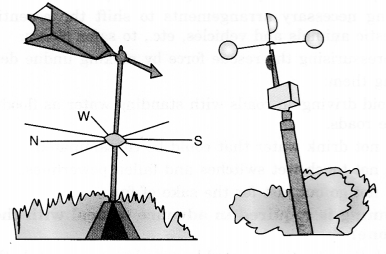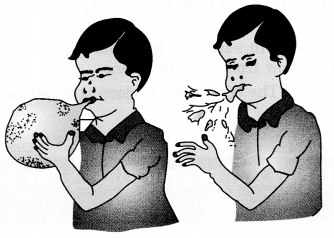NCERT Solutions for Class-7 Science Chapter-8 Winds, Storms and Cyclones
1. The wind is ……… air.
2. Winds are generated due to ……….. heating on the earth.
3. Near the earth’s surface …………. air rises up whereas ………. air comes down.
4. Air moves from a region of ……….. pressure to a region of ……….. pressure.
Answer:
1. moving
2. uneven
3. warm, comparatively cooler
4. high air, low air
Question 2. Suggest two methods to find out wind direction at a given place.
Answer: Two methods to find out wind directions are:
(i) using weathercock (Fig.).
(ii) one simple method used by common people is to hold some dust and release in the air. Dust will fly in the direction of air.
Fig. A weathercock
Question 3. State two experiences that made you think that air exerts pressure (other than those given in the text).
Answer:
Experiment 1: When we fill the air in a balloon it flattens due to pressure exerted by air. Also when it is overfilled with air it bursts due to excess air pressure
Fig. Air exerts pressure
Experiment 2: When we hang a banner in a place of moving fast air, it tears due to the pressure exerted by the air.
Question 4. You want to buy a house. Would you like to buy a house having windows but no ventilators? Explain your answer.
Answer: No, a house which has no ventilators is not a safe or healthy house to live in. The air circulation is not present in such a house. So, it has no fresh air. Because warm air rises up and goes out through ventilators and fresh air comes in through windows.
Question 5. Explain why holes are made in hanging banners and hoardings.
Answer: Air exerts pressure. If there are no holes in the banners and hoardings they will be damaged. To make them safe, holes are made to give the air safe passage.
Answer: I will help by following ways,
1. Warning everyone about the coming danger.
2. Searching for shelter.
3. Keeping storage of water and food.
4. Setting up a first-aid facility.
Answer: To deal with the situation created by a cyclone we must do the following planning in advance.
On the part of the government:
1. Rapid communication of warnings to the government agencies, the ports, fishermen, ships, and to the general public must be ensured.
2. There must be the construction of cyclone shelters in cyclone-prone areas and administrative arrangements for moving people fast to safer places.
On the part of the public following actions must be taken:
1. Keep ready the phone numbers of all emergency services like police, fire brigade, and medical centres.
2. Make necessary arrangements to shift the essential household goods, domestic animals and vehicles, etc., to safer places.
Question 8. Which one of the following places is unlikely to be affected by a cyclone?
(i) Chennai
(ii) Mangaluru (Mangalore)
(iii) Amritsar
(iv) Puri
Answer:
(iii) Amritsar
Question 9. Which of the statements given below is correct?
(i) In winter the winds flow from the land to the ocean.
(ii) In summer the winds flow from the land towards the ocean.
(iii) A cyclone is formed by a very high-pressure system with very high-speed winds revolving around it.
(iv) The coastline of India is not vulnerable to cyclones.
Answer:
(i) In winter the winds flow from the land to the ocean.

0 comment
Post a Comment